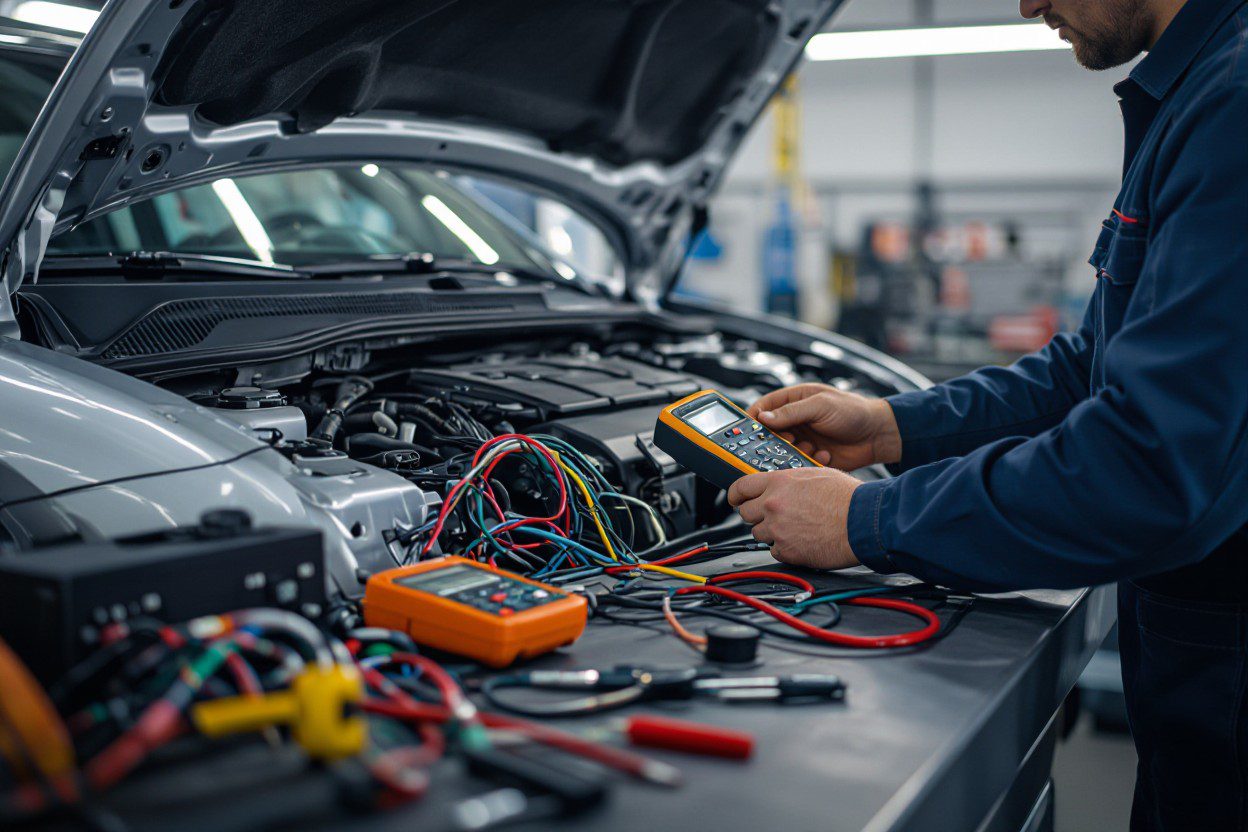Most car owners eventually face issues with their vehicle’s electrical system, and knowing how to address these problems can save you time and money. At Aloha Auto Repair, we provide expert car electrical repair services to diagnose and fix any faults in your vehicle’s wiring, battery, alternator, and more. Whether you’re searching for reliable car electrical repair near me or need advice on choosing the best car electrical repair shops, this guide will help you understand what to expect and how to maintain your car’s electrical health effectively.
Key Takeaways:
- Understanding common issues such as battery problems, alternator failures, and faulty wiring is crucial for effective car electrical repair.
- Finding reliable car electrical repair shops can ensure proper diagnosis and long-lasting solutions to your vehicle’s electrical system.
- Searching for car electrical repair near me helps locate certified technicians who specialize in handling complex electrical components of modern vehicles.
- Regular maintenance and timely inspections can help prevent major electrical failures and keep your car’s systems running smoothly.
- Aloha Auto Repair offers expert services and personalized care to address all your automotive electrical needs efficiently and affordably.

Diagnosing Electrical Problems: The First Step to Repair
Pinpointing electrical faults starts with observing your vehicle’s behavior—unexpected battery drain, flickering dashboard lights, or intermittent malfunction of power windows often signal deeper wiring or component issues. By methodically testing these symptoms, you gain valuable clues that help isolate the fault. Without a systematic approach, you risk replacing parts unnecessarily, leading to wasted time and expense. Accurate diagnosis streamlines the repair process, ensuring you address the root cause effectively and restore your car’s electrical system to optimal function.
Common Symptoms of Electrical Failures
Dimming headlights, unusual clicking noises when turning the ignition, or inconsistent operation of accessories like the radio or air conditioning frequently indicate electrical problems. You might also notice your battery warning light activating without obvious reasons or experience trouble starting the engine during cold weather. These symptoms typically arise from issues in wiring, fuse boxes, alternators, or battery connections, and recognizing them early can save you from more extensive damage.
Effective Diagnostic Tools and Techniques
Using a multimeter to measure voltage, current, and resistance helps you identify faults in circuits and components quickly. Scan tools interfaced with your car’s onboard diagnostics (OBD-II) port provide error codes for system malfunctions, guiding your troubleshooting efforts. Thermal imaging cameras reveal hot spots in wiring harnesses, pointing out shorts or overloaded circuits invisible to the naked eye.
Expanding on these tools, automotive diagnostic scanners connect seamlessly with your vehicle’s computer, translating error codes into specific electrical issues such as sensor failures or communication errors between modules. A digital multimeter offers granular insights into voltage drops or intermittent connectivity problems, while clamp meters measure current flow without disconnecting circuits, preserving system integrity during tests. Thermographic inspections expose subtle thermal anomalies in wiring or connectors, which often precede failure, enabling you to intervene before incidents escalate. Mastering these techniques enhances the accuracy and efficiency of your car electrical repair near me searches or visits to car electrical repair shops.
Navigating the Complex Wiring Systems of Modern Vehicles
Modern vehicles feature intricate wiring harnesses that integrate multiple electronic control units, sensors, and actuators. This complexity demands precise diagnostic skills and specialized tools. When wires are bundled tightly across the chassis and under the dashboard, tracing a fault requires patience and methodical testing rather than guesswork. Understanding how components like CAN buses, multiplexers, and relays communicate helps you target your car electrical repair efforts effectively, reducing downtime and avoiding unnecessary replacements.
Understanding Circuitry: A Guide to Automotive Electrical Systems
Your vehicle’s circuitry combines high-current lines powering motors and lights with sensitive low-voltage communication paths. Recognizing the difference enables you to pinpoint whether issues stem from blown fuses or damaged wiring, or from software glitches in control modules. A typical 12-volt system includes battery feeds, grounds, switches, and loads connected in series or parallel, but hybrid and electric models add high-voltage circuits, increasing repair complexity and safety concerns.
Identifying and Tracing Wiring Issues
Pinpointing wiring faults means visually inspecting for damaged insulation, corrosion, or loose connectors alongside using diagnostic tools like multimeters and oscilloscopes. Following wiring diagrams tailored to your vehicle model allows mapping the circuit paths and verifying voltage and continuity at key points. Intermittent faults—like shorts under vibration or moisture-induced resistance—often require dynamic testing or prolonged monitoring with data loggers to reproduce and diagnose failures accurately.
Further investigation into wiring issues involves systematic isolation of faulty circuits by disconnecting suspected components and performing continuity tests with back-probing connectors. Technologies such as infrared thermography can reveal hotspots indicating high resistance areas. Some advanced repair shops employ circuit simulators to replicate the electrical environment, enabling accurate fault detection and avoiding trial-and-error replacements. These diagnostic strategies protect your investment by ensuring repairs address root causes rather than symptoms.
Key Components and Their Role in Electrical Malfunctions
Understanding each key electrical component sharpens your ability to tackle stubborn issues yourself or communicate effectively with technicians. Faults often originate from corrosion at battery terminals, loose alternator belts, or worn starter motors, each uniquely impacting your vehicle’s electrical health. Your dashboard indicators can guide you—dim lights might hint at alternator trouble, while clicking noises suggest starter motor problems. Mastering the interplay among these parts reduces guesswork during car electrical repair and speeds up reaching a reliable solution.
The Battery: Heart of the Electrical System
Your vehicle’s battery stores the electrical energy necessary to power everything from the engine start to cabin electronics. Over time, battery capacity dwindles—typically around three to five years—which can manifest as sluggish starts or flickering dashboard lights. Regular checks on voltage levels and terminal cleanliness help maintain optimal performance. When you search for car electrical repair near me, a common first step for shops is testing the battery’s charge and replacing it if voltage drops below 12.4 volts under resting conditions.
Alternator and Starter Motor: Unveiling Their Interdependence
The alternator and starter motor function as an inseparable duo in your car’s electrical system. While the starter motor initiates engine rotation during ignition, the alternator sustains electrical supply once the engine runs. Alternator failures manifest as dead batteries after driving or dimming lights under load, whereas starter motor issues result in no-start conditions or repetitive clicking sounds. Their harmony ensures your car’s continuous operation; disruptions in one part often lead to strain or damage in the other.
Diving deeper, the alternator converts mechanical energy from the engine belt into electrical power, charging the battery and powering the vehicle’s systems. If the alternator’s voltage regulator fails, it can overcharge or undercharge the battery, leading to reduced battery life and frequent electrical malfunctions. Similarly, a weak starter motor draws excessive current, placing additional load on the battery and alternator. When diagnosing problems, technicians assess voltage output, belt tension, and starter current draw, often using specialized meters and load testers to pinpoint the exact cause within this interconnected system.
Step-by-Step Guide to Common Repairs
| Fixing Blown Fuses and Replacing Relays | Addressing Battery and Alternator Issues |
|---|---|
Fixing Blown Fuses and Replacing RelaysYou’ll find most fuse boxes under the dashboard or hood. Start by visually inspecting fuses for a broken filament or discoloration, then use a multimeter to check continuity. Replacing a blown fuse is simple—just swap it with one of the same amperage rating. For relays, listen for clicking sounds or swap with a similar relay in the box to test functionality. Your vehicle’s manual can help locate the right components, ensuring you don’t mix up fuses or relays that power different circuits. |
Addressing Battery and Alternator IssuesIf your engine struggles to start or electrical devices dim while running, the battery or alternator might be the cause. Begin with a voltmeter test: a healthy battery reads around 12.6 volts when off and 13.7-14.7 volts while running, indicating alternator charging. Corroded terminals and loose connections can mimic battery failure, so clean and tighten before replacing parts. For alternators, inspect the drive belt’s tension and condition. Replacement typically involves disconnecting the battery, removing the belt and wiring, then fitting the new unit securely. |
Addressing Battery and Alternator Issues
Digging deeper into battery and alternator diagnostics, testing the battery’s state of charge and health requires a load test or hydrometer for liquid batteries. If jump-starting works but problems return, the alternator may not be supplying adequate voltage or current. Alternators commonly fail due to worn brushes or diode faults, causing flickering lights or warning indicators. For accurate diagnosis, specialized tools like an oscilloscope or advanced battery tester can reveal subtle alternator irregularities before they lead to complete electrical failure, helping you avoid unexpected roadside breakdowns.
Preventative Measures: Keeping Your Car’s Electrical System Healthy
Maintaining your car’s electrical system requires consistent care to avoid costly car electrical repair. Checking battery connections routinely for corrosion and ensuring wires are secure prevents shorts and power drops. Regularly testing the alternator output and replacing aged fuses keeps the circuit functioning smoothly. Pay special attention to signs like flickering dashboard lights or slow power windows—early alerts that electrical components need attention. Thou can extend the lifespan of your vehicle’s electrical system by integrating simple yet effective upkeep habits into your routine maintenance.
Routine Maintenance Tips for Optimal Performance
Follow these simple steps to sustain your car’s electrical health:
- Inspect battery terminals monthly and clean corrosion with a baking soda solution.
- Test the alternator’s amperage output annually to ensure adequate charging.
- Replace worn or brittle wiring immediately to prevent shorts.
- Keep fuses in proper condition; swap any blown fuses without delay.
- Monitor the operation of lights and electronics regularly.
Thou will notice fewer unexpected electrical failures by addressing these tasks consistently.
The Importance of Professional Inspections
While daily checks help, only a professional can thoroughly diagnose complex electrical issues. Certified technicians at car electrical repair shops use specialized diagnostic tools to evaluate systems like the onboard computer, ABS modules, and alternator connections. Their expertise uncovers hidden problems invisible to basic visual inspection, ensuring no minor fault escalates into a breakdown.
Technicians at your local car electrical repair near me service run comprehensive electrical system scans to detect voltage irregularities and wiring faults that standard checks could miss. They also test battery health under load conditions and inspect grounding points crucial for stable electrical flow. Engaging professionals for routine inspections supports optimal vehicle reliability and avoids unexpected roadside failures, saving you time and expensive repairs.
Final Words
With these considerations in mind, you can confidently approach car electrical repair with a clearer understanding of what to expect. Whether you’re searching for car electrical repair near me or evaluating various car electrical repair shops, knowing the basics helps you make informed decisions. Trusting experienced professionals like those at Aloha Auto Repair ensures your vehicle’s electrical systems are properly diagnosed and fixed, saving you time and stress in the long run. Taking care of your car’s electrical needs promptly keeps your vehicle safe and reliable on the road.
FAQ About Car Electrical Repair at Aloha Auto Repair
Q: What are common signs that indicate I need car electrical repair?
A: Common signs that suggest your car needs electrical repair include dim or flickering headlights, malfunctioning dashboard lights, a dead battery, issues with power windows or locks, and problems with the car’s starter or alternator. If you notice any of these symptoms, it’s wise to bring your vehicle to a reliable car electrical repair shop such as Aloha Auto Repair for a thorough diagnosis.
Q: How can I find trustworthy car electrical repair near me?
A: To find a trustworthy car electrical repair near you, look for shops with positive customer reviews, certified technicians, and a range of services specifically focused on electrical systems. At Aloha Auto Repair, we offer expert diagnostics and repairs, backed by years of experience and customer satisfaction. Checking online ratings and asking for recommendations can also help you locate the best service providers close to your location.
Q: What types of services do car electrical repair shops typically provide?
A: Car electrical repair shops generally offer a variety of services including battery testing and replacement, alternator repair, starter motor repair, fixing wiring issues, diagnosing and repairing faults in the car’s lighting system, and addressing problems with electronic control units. Aloha Auto Repair provides comprehensive electrical system services to restore your vehicle’s performance and safety.
Q: How much does car electrical repair usually cost at shops like Aloha Auto Repair?
A: The cost of car electrical repair varies depending on the specific issue, the parts required, and the complexity of the repair. Simple battery replacements may cost less, while repairing wiring or electronic components can be more expensive due to labor and diagnostic time. At Aloha Auto Repair, we offer transparent pricing after evaluating your vehicle and provide estimates before any work begins to ensure there are no surprises.
Q: Can car electrical repair be done on older vehicles at Aloha Auto Repair?
A: Yes, car electrical repair can be performed on older vehicles as well at Aloha Auto Repair. Our technicians have experience working on a wide range of makes and models, including older cars. We use advanced diagnostic tools and quality replacement parts to ensure older vehicles receive accurate and lasting electrical repairs, helping to improve their reliability and safety.
Need help with car electrical repair? Download our expert-backed guide to troubleshoot issues quickly and confidently. Get back on the road with smoother, safer repairs—start your fix today!
Also read:
Auto Maintenance: Keeping Your Vehicle in Top Shape
Your Trusted Auto Preventive Maintenance Checklist for Stress-Free Driving
Aloha Auto Repair’s Emergency Car Repair Solutions: Survive Any Roadside Crisis






